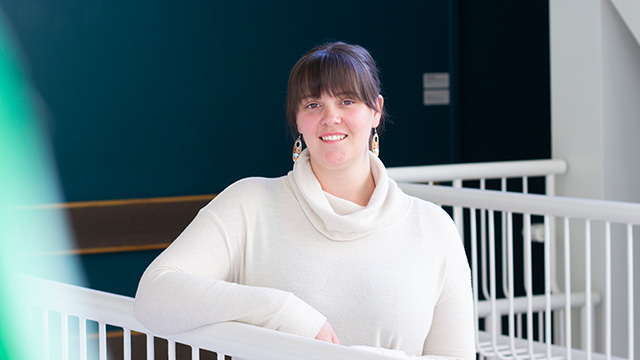
Medical lab technologist Megan Parrish is now pursuing a master's in public health, while working in various roles to support fellow Indigenous learners on campus.
When Megan Parrish began a degree in medical laboratory sciences (MLS) in 2011, she was one of only two Indigenous students in her year. In most departments on campus at that time, including hers, there wasn't much purposeful focus on Indigenous history in Canada, she recalls. "There wasn't even the acknowledgement that we're on traditional territory."
Today, after several years in the workforce as a medical lab technologist and taking time off to be a mother to 11-month-old Ethan, Parrish is back in school pursuing a master's in public health. It's different now on campus, she says, which reflects broader changes outside the halls of academia. In her current program there's a strong push to build awareness of traditional Indigenous medicine and find ways to incorporate it into other modes of care. There's also a growing body of global research into Indigenous public health, which has inspired her to dream of one day pursuing a PhD that could directly impact the wellness of her community. But for now, she's focused on supporting her fellow students.
Parrish sat on the U of A's Aboriginal Students' Council (ASC) for the fall 2019 semester, helping launch a newsletter and working with the team on a successful push to obtain official student representative association status. They have since launched a grant subsidy and are now working to create scholarships, child-care subsidies and other supports for Indigenous students. Although she's stepped back from an official role with the ASC, Parrish continues to volunteer with events such as the annual memorial march on the National Day of Action for Missing and Murdered Indigenous Women.
Parrish is now treasurer and co-chair of the Indigenous Graduate Student Association (IGSA), recently representing them in the recruitment process for a Supporting Aboriginal Graduate Enhancement (SAGE) coordinator. This role will involve increasing engagement with learners, encouraging more Indigenous students to pursue graduate studies and gathering the community for informal monthly meals and cultural activities.
Beyond these extracurricular involvements, Parrish has been invited to participate in the final session of the first-ever Foundations of Indigenous Health course in medical laboratory science. Last fall, the first cohort of first-year MLS students began the course, a mixed series of large-group lectures and online modules that provide an introduction to aboriginal peoples' histories, experiences and knowledge systems and how they connect to health-care practices.
The mandatory, for-credit course is a point of pride for program director Lisa Purdy, who worked closely with past Indigenous Health Initiatives Program director Tibetha Kemble to design the curriculum. MLS is the only program in the faculty where this content exists as a standalone course, rather than being included within existing curricula.
During their visit, Parrish and fellow MLS alumna Theora Gray will speak about the importance of truth and reconciliation for all health professionals, as well as their experiences as Indigenous students and medical laboratory technologists in the workforce. They'll be joined by Rick Lightning, who will speak about his experiences as an Indigenous person navigating the health-care system.
Parrish is honoured to take part in this learning opportunity. "I think having someone come in and speak is a lot better," she says. "It has a bigger impact; it's much more personal."
Building awareness among non-Indigenous people with courses like this is key, says Parrish. But it's bigger than that. She would like to see culturally safe spaces built more widely into the architecture on campus, where Indigenous learners could talk to an elder or just take time out of a hectic day to decompress.
Parrish's drive to advocate for more and better resources, especially in the Faculty of Medicine & Dentistry, is tireless. "I've met a lot of people who have had a lot of struggles going to school," she says, "and being able to provide support and community for them is huge to me."